Module 11 Way of life Unit3 Language in use课件(共29张PPT)
文档属性
| 名称 | Module 11 Way of life Unit3 Language in use课件(共29张PPT) | 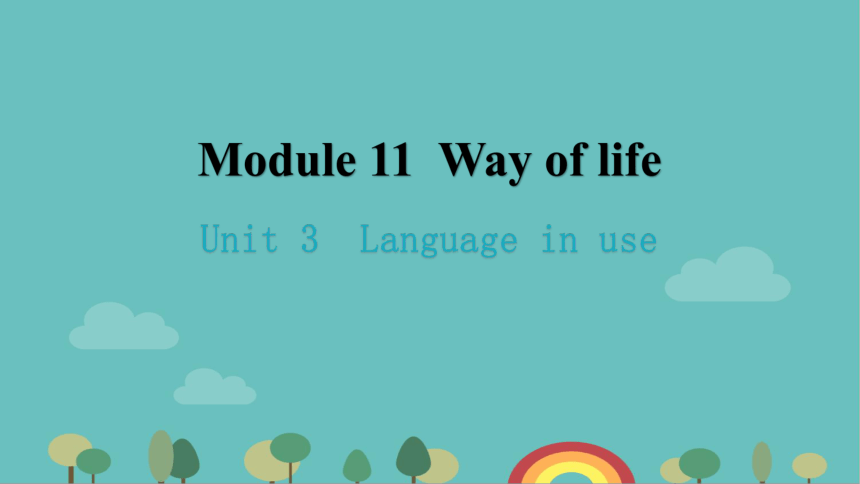 | |
| 格式 | pptx | ||
| 文件大小 | 159.2KB | ||
| 资源类型 | 教案 | ||
| 版本资源 | 外研版 | ||
| 科目 | 英语 | ||
| 更新时间 | 2022-09-24 22:41:12 | ||
图片预览

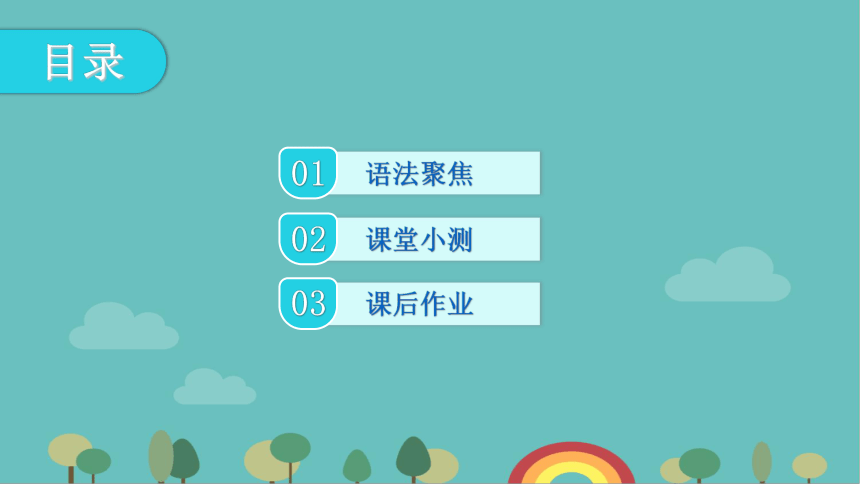


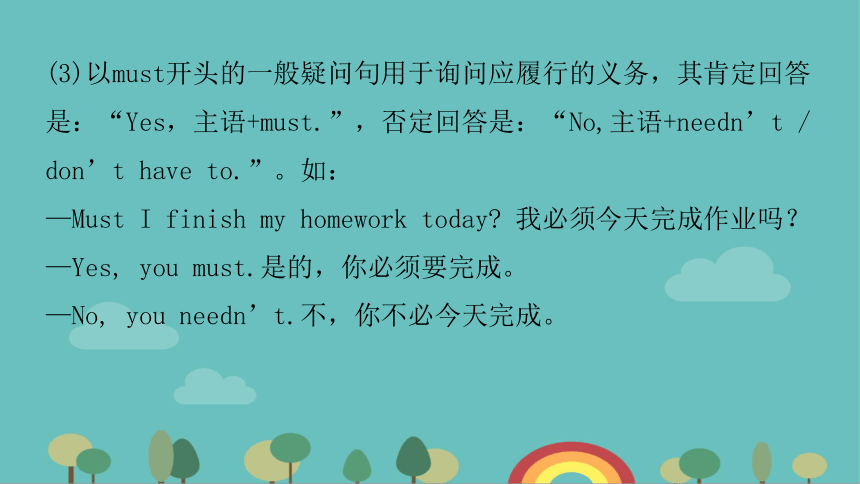
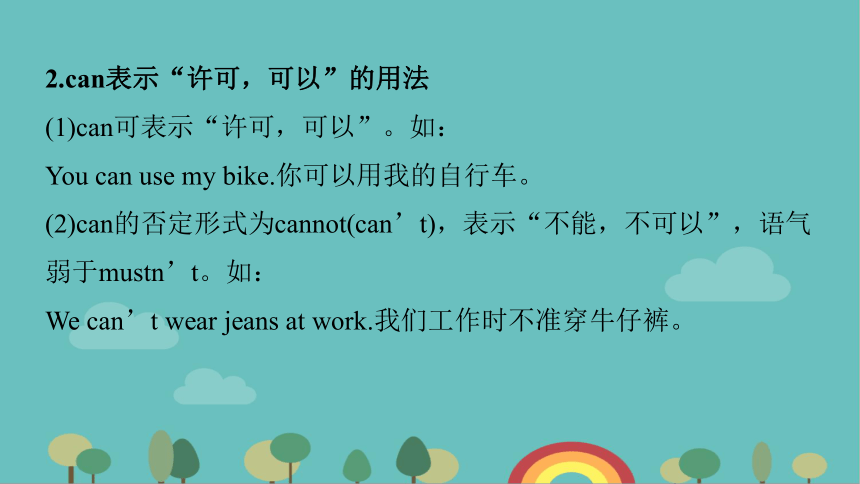
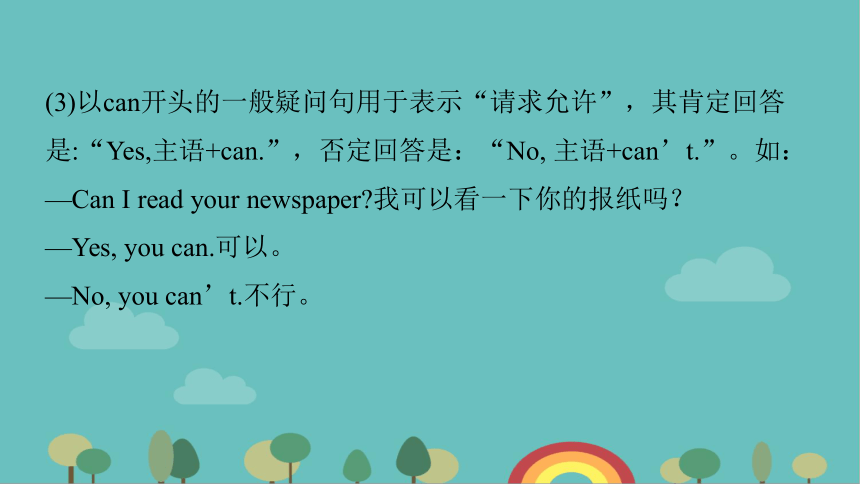

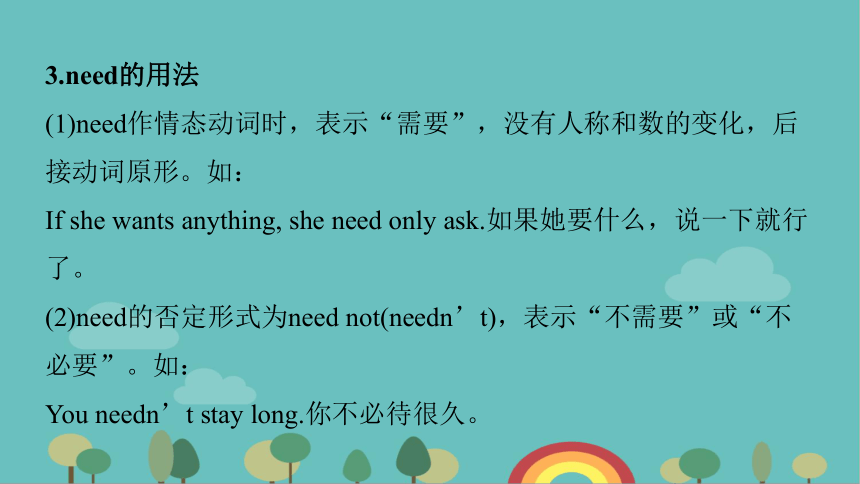
文档简介
(共29张PPT)
Module 11 Way of life
Unit 3 Language in use
目录
课堂小测
02
课后作业
03
语法聚焦
01
语法聚焦
情态动词must, can, need, have to
1.must表示“必须,一定要”的用法
(1)must可表示“必须,一定要”,多用来强调说话人的主观看法,认为有必要或有义务去做某事,用于现在时。如:
You must get there before six o’clock.你们必须在六点前赶到那里。
(2)must的否定形式为must not (mustn’t) ,表示“不能”或“禁止”。如:
You mustn’t eat snacks in the classroom.教室里禁止吃零食。
(3)以must开头的一般疑问句用于询问应履行的义务,其肯定回答是:“Yes,主语+must.”,否定回答是:“No,主语+needn’t / don’t have to.”。如:
—Must I finish my homework today 我必须今天完成作业吗?
—Yes, you must.是的,你必须要完成。
—No, you needn’t.不,你不必今天完成。
2.can表示“许可,可以”的用法
(1)can可表示“许可,可以”。如:
You can use my bike.你可以用我的自行车。
(2)can的否定形式为cannot(can’t),表示“不能,不可以”,语气弱于mustn’t。如:
We can’t wear jeans at work.我们工作时不准穿牛仔裤。
(3)以can开头的一般疑问句用于表示“请求允许”,其肯定回答是:“Yes,主语+can.”,否定回答是:“No, 主语+can’t.”。如:
—Can I read your newspaper 我可以看一下你的报纸吗?
—Yes, you can.可以。
—No, you can’t.不行。
【拓展】may也可以表示“允许,许可”,比can更加正式、礼貌。如:
You may come if you wish.你想来的话可以来。
3.need的用法
(1)need作情态动词时,表示“需要”,没有人称和数的变化,后接动词原形。如:
If she wants anything, she need only ask.如果她要什么,说一下就行了。
(2)need的否定形式为need not(needn’t),表示“不需要”或“不必要”。如:
You needn’t stay long.你不必待很久。
(3)以need开头的一般疑问句用于询问“是否有必要”,其肯定回答是:“Yes, 主语+must.”,否定回答是:“No,主语+needn’t.”。如:
—Need he do his homework first 他需要先做作业吗?
—Yes, he must.是的,他必须做。
—No, he needn’t.不,没必要。
【注意】need作实义动词时,意为“需要”,在句子中有人称和数的变化。如:
She needs to get some sleep.她需要睡会儿觉。
4.have to的用法
(1)have to也表示“必须”,但与must相比,have to侧重于客观需要,含有“不得不,被迫”的意思。have to有人称和数的变化,可用于过去时、现在时、将来时等,后接动词原形。如:
My bike was broken yesterday, so I had to walk to school.昨天我的自行车坏了,所以我只能走路去学校。
(2)have to的疑问句式和否定句式需要借助助动词do或will。如:
—Do the children have to wear a uniform 孩子们必须穿制服吗?
—No,they don’t have to.不,他们不需要。
一、单项填空
( )1.The designer has tried every possible way to make the robot light, so you _________ worry about its weight.
A.must B.may C.can’t D.needn’t
( )2.According to the notice, guests at this hotel _________ use the sports centre at no extra cost.
A.can B.should C.must D.need
专练
A
A
( )3.Cars, buses and bikes _____ stop at the red lights.
A.can B.must C.might D.may
( )4.—Must I go to the office every day
—No, you _____.You can work from home.
A.can’t B.mustn’t C.needn’t D.shouldn’t
( )5.They have many eggs in the fridge.You _____ buy any more.
A.don’t need B.needn’t to C.don’t need to D.need to not
B
C
C
二、根据要求完成句子,每空一词
6.You must open the present now.(改为否定句)
You ____________ ____________ the present now.
7.Jack has to get home before 8 pm every night.(改为否定句)
Jack ____________ ____________ ____________ get home before 8 pm every night.
mustn’t
open
doesn’t
have
to
8.They can go to the basketball game.(改为一般疑问句)
____________ ____________ go to the basketball game
9.You must finish your homework now.(改为一般疑问句并作否定回答)
—____________ I finish ____________ homework now
—No, ____________ ____________.
Can
they
Must
my
you
needn’t
10.Don’t play music loudly after 10 pm.(改为同义句)
You ____________ ____________ music loudly after 10 pm.
mustn’t
play
课堂小测
一、根据句意及首字母或汉语提示填单词(注意使用正确形式)
1.My English teacher is a good teacher with a lot of e__________.
2.My maths teacher is really____________ (认真严肃的) about his work.
3.The company wanted him to work there,but he didn’t ____________ (接受) it.
xperience
serious
accept
4.—Bob, would you mind moving your bike
—Sorry! I’ll do it i____________.
5.I touched his ____________ (肩膀) and said hello to him.
mmediately
shoulder
二、找出下列句子的错误,并在横线上进行更正
6.How a kind girl she is!
________________________
7.I think you should calling your uncle now.
________________________
8.I learned to swim at the age of twelfth.
________________________
How改为What
calling改为call
twelfth改为twelve
9.In China, we must accept a gift for both hands.
________________________
10.Ms Liu is not just a teacher and a very good friend of ours.
________________________
for改为with
and改为but
三、语法选择
Numbers in different countries may have different meanings.In China, some people think that some numbers bring _11_ good luck.Take “8” for example.The Chinese pronunciation of the number “8” has almost the same sound as that of the Chinese character “发”,which means _12_ a fortune.Therefore, many Chinese people spend a lot of money to get their telephone
numbers or car numbers _13_ number “8”.They believe that the number _14_ them money.
However, _15_ don’t believe that numbers have anything to do with good luck.They think such _16_ idea is only an ignorant(愚昧的) and superstitious(迷信的) belief.A number is one thing, and good luck is another.They will ask, “_17_ can you ever have any good luck simply because of some lucky numbers, even if you don’t work hard?”
As for me, I agree with the latter(后者)._18_, lucky numbers are only a kind of superstition.Perhaps it holds true for some cases, _19_ often it does not.Numbers can never bring good luck to a person at all and our fortune(命运) is in our own hands.So, everyone _20_ have a good fortune only if he tries his best.Let’s always remember and “No pains, no gains.”
( )11.A.they B.their C.them
( )12.A.making B.make C.to make
( )13.A.with B.in C.on
( )14.A.bring B.will bring C.brought
( )15.A.other B.the other C.others
C
A
A
B
C
( )16.A.an B.a C.the
( )17.A.Why B.What C.How
( )18.A.Clear B.Clearer C.Clearly
( )19.A.but B.so C.if
( )20.A.should B.can C.need
A
C
C
A
B
课后作业
此部分习题详见独立装订的《分层作业本》。请同学们完成Module 11 Unit 3的练习题。
THANKS!
Module 11 Way of life
Unit 3 Language in use
目录
课堂小测
02
课后作业
03
语法聚焦
01
语法聚焦
情态动词must, can, need, have to
1.must表示“必须,一定要”的用法
(1)must可表示“必须,一定要”,多用来强调说话人的主观看法,认为有必要或有义务去做某事,用于现在时。如:
You must get there before six o’clock.你们必须在六点前赶到那里。
(2)must的否定形式为must not (mustn’t) ,表示“不能”或“禁止”。如:
You mustn’t eat snacks in the classroom.教室里禁止吃零食。
(3)以must开头的一般疑问句用于询问应履行的义务,其肯定回答是:“Yes,主语+must.”,否定回答是:“No,主语+needn’t / don’t have to.”。如:
—Must I finish my homework today 我必须今天完成作业吗?
—Yes, you must.是的,你必须要完成。
—No, you needn’t.不,你不必今天完成。
2.can表示“许可,可以”的用法
(1)can可表示“许可,可以”。如:
You can use my bike.你可以用我的自行车。
(2)can的否定形式为cannot(can’t),表示“不能,不可以”,语气弱于mustn’t。如:
We can’t wear jeans at work.我们工作时不准穿牛仔裤。
(3)以can开头的一般疑问句用于表示“请求允许”,其肯定回答是:“Yes,主语+can.”,否定回答是:“No, 主语+can’t.”。如:
—Can I read your newspaper 我可以看一下你的报纸吗?
—Yes, you can.可以。
—No, you can’t.不行。
【拓展】may也可以表示“允许,许可”,比can更加正式、礼貌。如:
You may come if you wish.你想来的话可以来。
3.need的用法
(1)need作情态动词时,表示“需要”,没有人称和数的变化,后接动词原形。如:
If she wants anything, she need only ask.如果她要什么,说一下就行了。
(2)need的否定形式为need not(needn’t),表示“不需要”或“不必要”。如:
You needn’t stay long.你不必待很久。
(3)以need开头的一般疑问句用于询问“是否有必要”,其肯定回答是:“Yes, 主语+must.”,否定回答是:“No,主语+needn’t.”。如:
—Need he do his homework first 他需要先做作业吗?
—Yes, he must.是的,他必须做。
—No, he needn’t.不,没必要。
【注意】need作实义动词时,意为“需要”,在句子中有人称和数的变化。如:
She needs to get some sleep.她需要睡会儿觉。
4.have to的用法
(1)have to也表示“必须”,但与must相比,have to侧重于客观需要,含有“不得不,被迫”的意思。have to有人称和数的变化,可用于过去时、现在时、将来时等,后接动词原形。如:
My bike was broken yesterday, so I had to walk to school.昨天我的自行车坏了,所以我只能走路去学校。
(2)have to的疑问句式和否定句式需要借助助动词do或will。如:
—Do the children have to wear a uniform 孩子们必须穿制服吗?
—No,they don’t have to.不,他们不需要。
一、单项填空
( )1.The designer has tried every possible way to make the robot light, so you _________ worry about its weight.
A.must B.may C.can’t D.needn’t
( )2.According to the notice, guests at this hotel _________ use the sports centre at no extra cost.
A.can B.should C.must D.need
专练
A
A
( )3.Cars, buses and bikes _____ stop at the red lights.
A.can B.must C.might D.may
( )4.—Must I go to the office every day
—No, you _____.You can work from home.
A.can’t B.mustn’t C.needn’t D.shouldn’t
( )5.They have many eggs in the fridge.You _____ buy any more.
A.don’t need B.needn’t to C.don’t need to D.need to not
B
C
C
二、根据要求完成句子,每空一词
6.You must open the present now.(改为否定句)
You ____________ ____________ the present now.
7.Jack has to get home before 8 pm every night.(改为否定句)
Jack ____________ ____________ ____________ get home before 8 pm every night.
mustn’t
open
doesn’t
have
to
8.They can go to the basketball game.(改为一般疑问句)
____________ ____________ go to the basketball game
9.You must finish your homework now.(改为一般疑问句并作否定回答)
—____________ I finish ____________ homework now
—No, ____________ ____________.
Can
they
Must
my
you
needn’t
10.Don’t play music loudly after 10 pm.(改为同义句)
You ____________ ____________ music loudly after 10 pm.
mustn’t
play
课堂小测
一、根据句意及首字母或汉语提示填单词(注意使用正确形式)
1.My English teacher is a good teacher with a lot of e__________.
2.My maths teacher is really____________ (认真严肃的) about his work.
3.The company wanted him to work there,but he didn’t ____________ (接受) it.
xperience
serious
accept
4.—Bob, would you mind moving your bike
—Sorry! I’ll do it i____________.
5.I touched his ____________ (肩膀) and said hello to him.
mmediately
shoulder
二、找出下列句子的错误,并在横线上进行更正
6.How a kind girl she is!
________________________
7.I think you should calling your uncle now.
________________________
8.I learned to swim at the age of twelfth.
________________________
How改为What
calling改为call
twelfth改为twelve
9.In China, we must accept a gift for both hands.
________________________
10.Ms Liu is not just a teacher and a very good friend of ours.
________________________
for改为with
and改为but
三、语法选择
Numbers in different countries may have different meanings.In China, some people think that some numbers bring _11_ good luck.Take “8” for example.The Chinese pronunciation of the number “8” has almost the same sound as that of the Chinese character “发”,which means _12_ a fortune.Therefore, many Chinese people spend a lot of money to get their telephone
numbers or car numbers _13_ number “8”.They believe that the number _14_ them money.
However, _15_ don’t believe that numbers have anything to do with good luck.They think such _16_ idea is only an ignorant(愚昧的) and superstitious(迷信的) belief.A number is one thing, and good luck is another.They will ask, “_17_ can you ever have any good luck simply because of some lucky numbers, even if you don’t work hard?”
As for me, I agree with the latter(后者)._18_, lucky numbers are only a kind of superstition.Perhaps it holds true for some cases, _19_ often it does not.Numbers can never bring good luck to a person at all and our fortune(命运) is in our own hands.So, everyone _20_ have a good fortune only if he tries his best.Let’s always remember and “No pains, no gains.”
( )11.A.they B.their C.them
( )12.A.making B.make C.to make
( )13.A.with B.in C.on
( )14.A.bring B.will bring C.brought
( )15.A.other B.the other C.others
C
A
A
B
C
( )16.A.an B.a C.the
( )17.A.Why B.What C.How
( )18.A.Clear B.Clearer C.Clearly
( )19.A.but B.so C.if
( )20.A.should B.can C.need
A
C
C
A
B
课后作业
此部分习题详见独立装订的《分层作业本》。请同学们完成Module 11 Unit 3的练习题。
THANKS!
同课章节目录
- Module 1 How to learn English
- Unit 1 Let's try to speak English as much as possi
- Unit 2 You should smile at her.
- Unit 3 Language in use .
- Module 2 My home town and my country
- Unit 1 It's taller than many other buildings.
- Unit 2 Cambridge is a beautiful city in the east o
- Unit 3 Language in use .
- Module 3 Sports.
- Unit 1 Nothing is more exciting than playing tenni
- Unit 2 This year we training more carefully.
- Unit 3 Language in use .
- Module 4 Planes, ships and trains .
- Unit 1 He lives the farthest from school.
- Unit 2 What is the best way to travel.
- Unit 3 Language in use .
- Module 5 Lao She Teahouse.
- Unit 1 I wanted to see the Beijing Opera.
- Unit 2 It descibes the changes in Chinese society.
- Unit 3 Language in use .
- Module 6 Animals in danger.
- Unit 1 It allows people to get closer to them .
- Unit 2 The WWF is working hard to save them all.
- Unit 3 Language in use .
- Revision module A
- Module 7 A famous story
- Unit 1 Alice was sitting with her sister by the ri
- Unit 2 She was thinking about her cat.
- Unit 3 Language in use .
- Module 8 Accidents
- Unit 1 While the car were changing to red, a car s
- Unit 2 I was trying to pick it up when it bite me
- Unit 3 Language in use .
- Module 9 Population
- Unit 1 The population of China is about 1.37 billi
- Unit 2 Arnwick was a city with 200,000 people.
- Unit 3 Language in use .
- Module 10 The weathe
- Unit 1 It might snow.
- Unit 2 The weather is fine all year round.
- Unit 3 Language in use .
- Module 11 Way of life
- Unit 1 In China ,we open a gift later.
- Unit 2 In England, you usually drink tea with milk
- Unit 3 Language in use .
- Module 12 Help
- Unit 1 What should we do before help arrives?
- Unit 2 Stay away from windows and heavy furniture.
- Unit 3 Language in use .
- Revision module B
